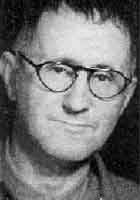Questions From A Worker Who Reads Poem by Bertolt Brecht
Questions From A Worker Who Reads
Who built Thebes of the seven gates?
In the books you will find the names of kings.
Did the kings haul up the lumps of rock?
And Babylon, many times demolished
Who raised it up so many times? In what houses
of gold-glittering Lima did the builders live?
Where, the evening that the Wall of China was finished
Did the masons go? Great Rome
Is full of triumphal arches. Who erected them? Over whom
Did the Caesars triumph? Had Byzantium, much praised in song
Only palaces for its inhabitants? Even in fabled Atlantis
The night the ocean engulfed it
The drowning still bawled for their slaves.
The young Alexander conquered India.
Was he alone?
Caesar beat the Gauls.
Did he not have even a cook with him?
Philip of Spain wept when his armada
Went down. Was he the only one to weep?
Frederick the Second won the Seven Year's War. Who
Else won it?
Every page a victory.
Who cooked the feast for the victors?
Every ten years a great man?
Who paid the bill?
So many reports.
So many questions.
So many reports. So many questions.....a good historical analysis...good questions...good poem- 10++++
a very interesting poem begging the question of who did all the hard work in the past? my answer is it will probably be the same ones who will do it in the future?
When reality rise itself from it's grave, the authority, the tradition, the custom and what not get undressed. Great thinking. Thanks for the poem, X
So many reports So many questions Nice poetic style. Great work! Sylva.
Very fundamental questions raised through a meaningful verse. Congrats on modern poet of the Day.
Questions and answers. Thanks for sharing this poem with us.
This poem has not been translated into any other language yet.
I would like to translate this poem
In each case the worker is the forgotten person. The most powerful treatment of this theme is Jenny the chambermaid's song in Brecht and Weill's superb Threepenny Opera.